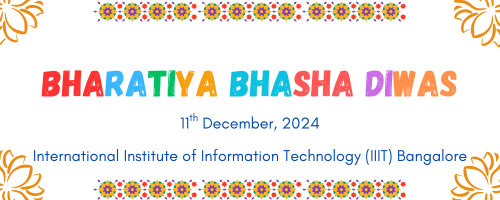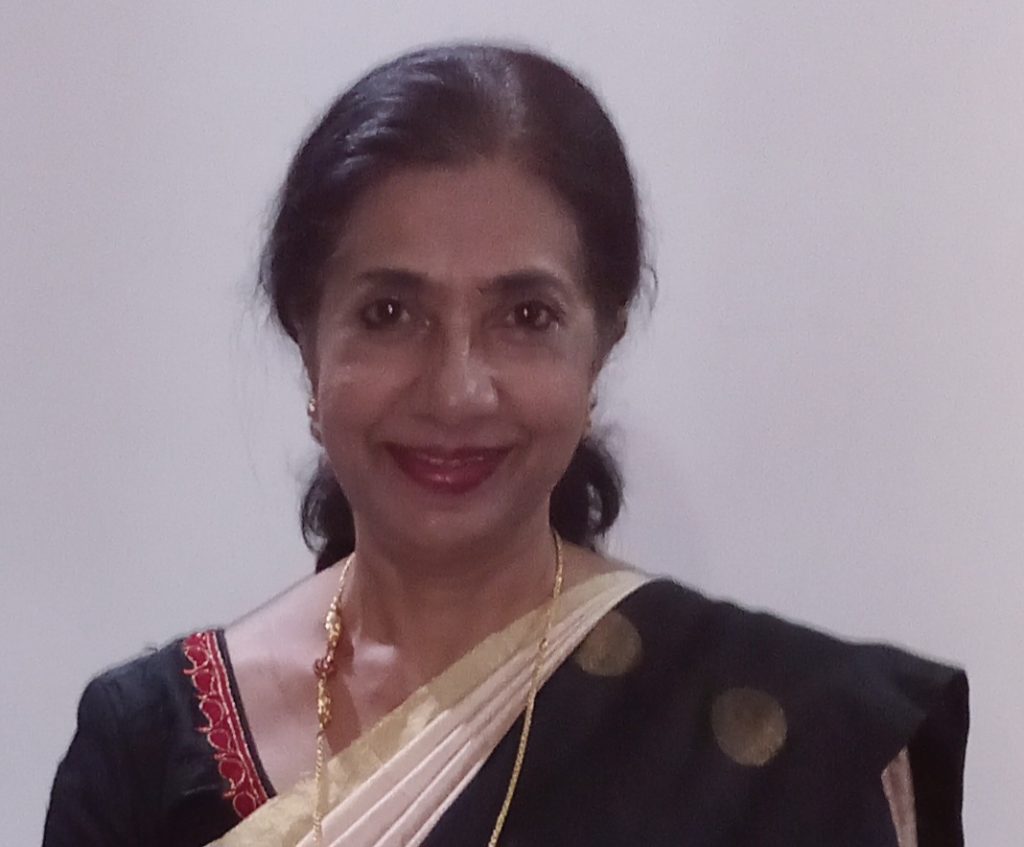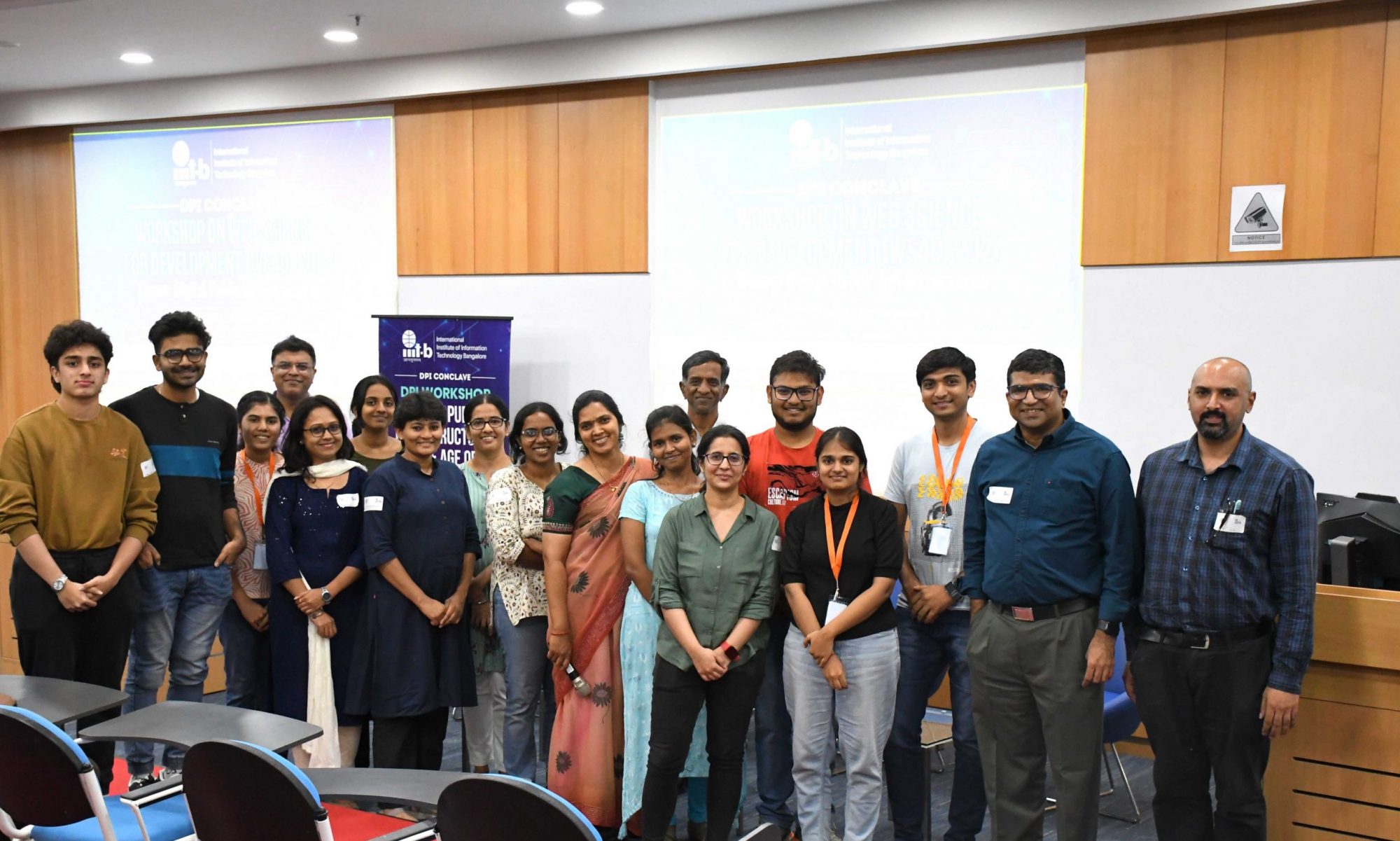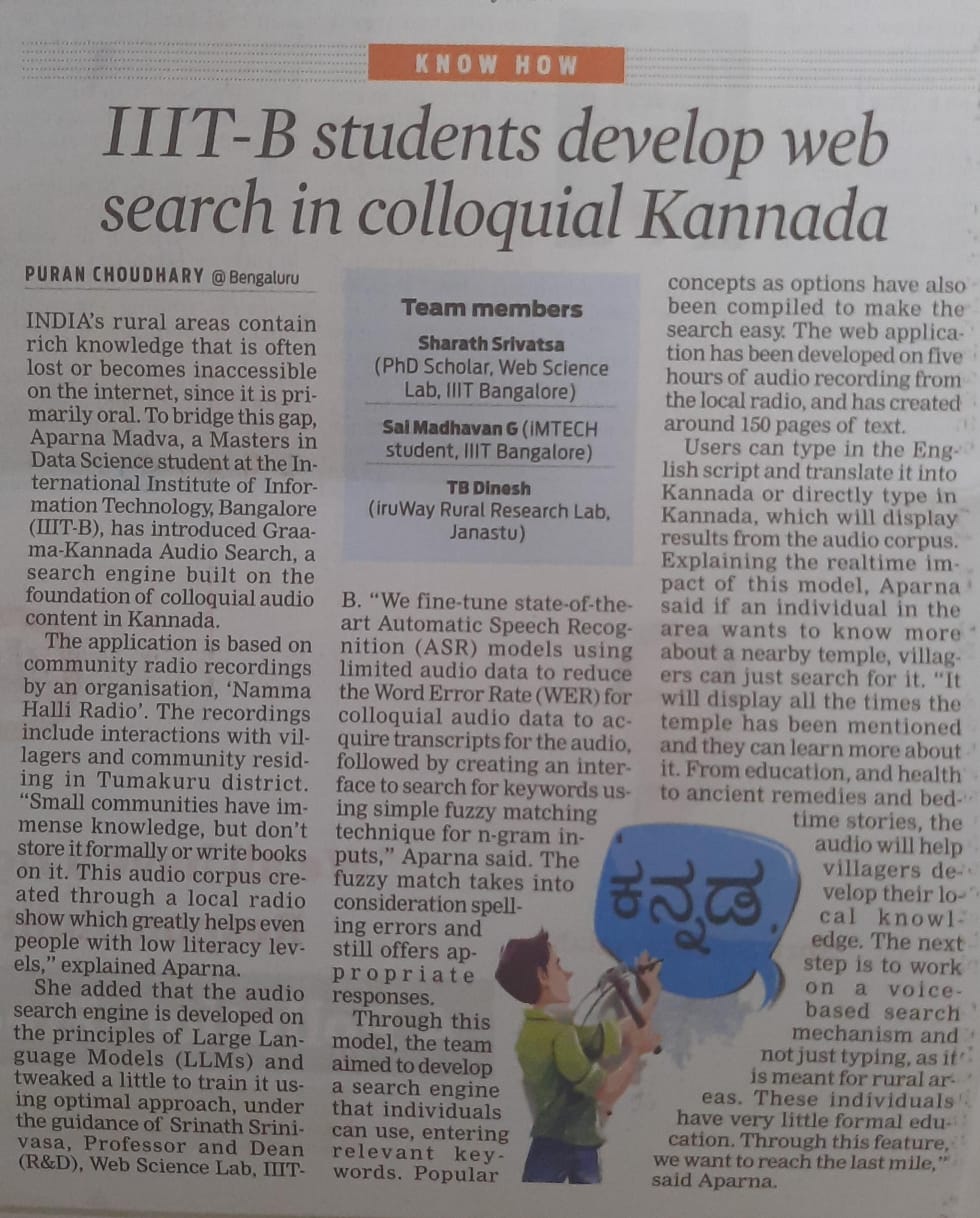
Bharatiya Bhasha Diwas will be observed on 11th December, 2024 at IIIT Bangalore. The focus will be on technologies in, for and through Indian languages. The event will include several technical talks and demonstrations focusing on Indian language technologies by eminent speakers from industry and academia.
Bharatiya Bhasha Diwas is celebrated to honour the Janma Jayanti (birth anniversary) of Mahakavi Subramania Bharati and celebrates India’s rich linguistic heritage and nurtures multilingualism. With the growth of Artificial Intelligence (AI) throughout the globe, India is on the verge of a digital revolution with the aims of bridging linguistic and regional gaps using various tasks such as text generation, machine translation, question answering, voice recognition, and conversational AI. This one-day event aims to bring together enthusiasts from diverse backgrounds including AI practitioners, linguists, and social scientists. The goal is to promote research and innovation, build an inclusive and collaborative community, and foster student engagement. We welcome students, researchers, practitioners, and anyone keen to contribute to the growth of technologies in Indian languages to join the event by registering here.
Time : 10:00 – 16:30 IST
Venue : In-person – R-103, Ramanujan, International Institute of Information Technology Bangalore (IIITB) 26/C, Hosur Rd, Electronics City Phase 1, Electronic City, Bengaluru, Karnataka 560100
Online – meeting link will be sent to registered attendees

Talks
Prof. Pushpak Bhattacharyya (Keynote talk)
Title: Low Resource Machine Translation of Indic Languages
Abstract: Indic Languages provide a diverse and exciting panorama of linguistic phenomena. Translation among these languages (including English too) involves several linguistic and resource challenges. In this talk, we discuss the techniques for and performance with analysis in handling the challenges of low resources in Indic MT. Subwording, pivoting, phrase table injection, use of translationese, Multilingual training, post-editing, etc. are among the techniques. The discussions are based on our work reported in top-quality conferences and journals.

Speaker Bio: Prof Pushpak Bhattacharyya (http://www.cse.iitb.ac.in/~pb) is Bhagat Singh Rekhi Chair Professor of Computer Science and Engineering at IIT Bombay. He has done extensive research in Natural Language Processing and Machine Learning. Some of his noteworthy contributions are Sarcasm Metaphor Hyperbole Detection, IndoWordnet, Cognitive NLP, Low Resource MT, and Knowledge Graph-Deep Learning Synergy in Information Extraction and Question Answering. He has published more than 450 research papers (https://scholar.google.co.in/citations?user=vvg-pAkAAAAJ&hl=en, 17K+ citations and h-index 62 as on Oct 24), has authored/co-authored 8 books including a textbook on machine translation (2015) and one on NLP (2023), and has guided close to 400 students for their Ph.D., Masters, and Undergraduate thesis. Prof. Bhattacharyya has been a visiting researcher at MIT and a visiting faculty at Stanford. He is a Fellow of the National Academy of Engineering, an Abdul Kalam National Fellow, a Distinguished Alumnus of IIT Kharagpur, an ex-director of IIT Patna, and a past President of ACL (Association of Computational Linguistics).
Dr. Shakira Jabeen
Title: Multiple Languages of India, Multilingualism, Constitutional Guarentees and Preventing Language Death

Abstract: The talk is aimed at explaining crucial concepts pertaining to social behaviour towards language/s. The age old language scene of India is used as a diving board to focus on existing language issues. Effort is made to draw a distinction between multilingualism of the West and Indian multilinguality. Analyzing the issue of language death, the talk tries to focus on ways to prevent the loss of languages. This framework is handled with an aim to address graduate and post graduate students of technical and managerial stream.
Revendranath T
Title: LLMs for Indic Languages: Challenges & Opportunities
Abstract: The talk covers a use cases of LLMs for Indic Languages. Challenges in developing solutions or products for Indic languages, and opportunities for the business adaptation
Speaker Bio: Revendra works as a Project Manager at Next Labs, a Research & Innovation vertical of Mphasis. He believes in the promise of AI and Quantum technologies in transforming the human and business experiences. Revendra worked in IT services delivery and product development for 4 years, and 11 years of experience in research. Besides, he has an experience in consulting for non-profit organisations and government agencies.
Schedule
| Time | Speaker | Title |
|---|---|---|
| 10:00 – 10:45 | Inauguration | |
| 10:45 – 11:00 | Break | |
| 11:00 – 12:00 | Prof. Pushpak Bhattacharyya (Keynote talk) | Low Resource Machine Translation of Indic Languages |
| 12:00 – 13:00 | Dr. Shakira Jabeen | Multiple Languages of India, Multilingualism, Constitutional Guarentees and Preventing Language Death |
| 13:00 – 14:00 | Lunch Break | |
| 14:00 – 15:00 | Revendranath T (Mphasis) | LLMs for Indic Languages: Challenges & Opportunities |
| 15:00 – 16:00 | Niharikasri Parasa | Indic NLP : Progress, Gaps and Future Directions |
| 16:00 – 16:15 | Closing remarks |


